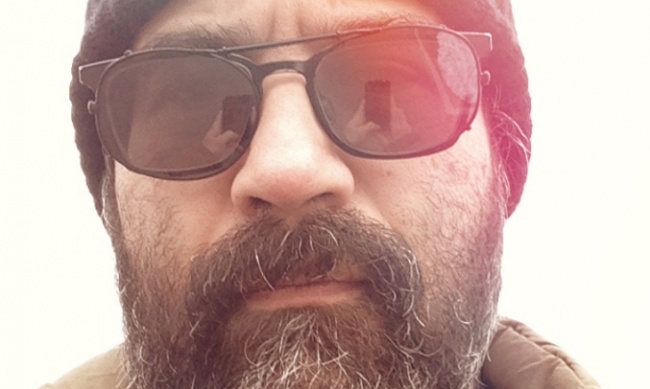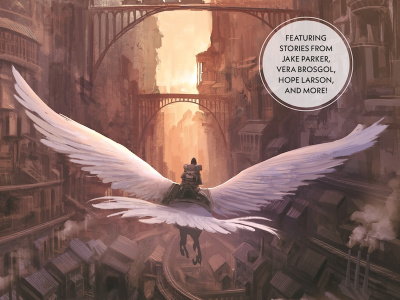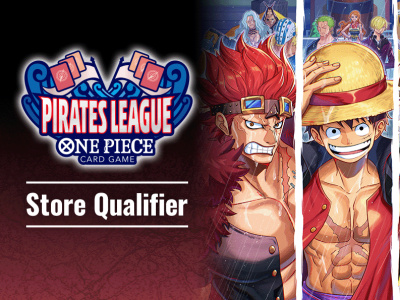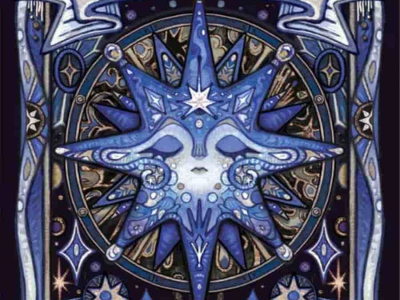In Business 3x3, a business executive, often a retailer, will share their experience with three things they’ve done right, three things they’ve done wrong, and what else they’ve learned along the way.
Greg Pak is a Rhodes Scholar gone wrong.
The current writer of Weapon H, Mech Cadet Yu and more was a childhood writer who was also interested in politics. He put in one stint on an Ann Richards gubernatorial campaign in Texas when destiny came calling.
“I went to Oxford on a Rhodes Scholarship ostensibly to study history so that I could be a better politician,” Pak says.
But while there, he came across a student film group and started working with them. “It fit into this whole storytelling thing that I’d always been compelled by,” Pak says today. “All the lights went on.”
Pak enrolled in New York University’s film school, where he made a ton of independent shorts and a feature called Robot Stories that became a hit on the festival circuit.
“Then my agent called and said Marvel was looking for new voices for comics writers, and I was like, ‘That sounds amazing,’” Pak says. “I'd never thought of writing comics before, even though I'd read comics all my life.”
Pak is a creator, but retail should be-slash-is a creative endeavor as well. Many of the things he’s learned, both good and bad, can be applied broadly and in-store as well:
THE GOOD
JUMP ON ANY CHANCE
Anything to get experience, make a connection—and make a buck—can be a good thing.
“If I had an opportunity, I was going to jump on it, even if it wasn't the opportunity that I initially was looking for,” Pak says. “I went to film school to become a feature filmmaker, but I jumped on other chances as they came up, even stuff as seemingly mundane as shooting and editing wedding videos, or doing instructional videos.”
Pak thinks that anything can be a learning experience, and the varied jobs helped him in the long run.
“Now, I'm writing kids' books. I'm writing novels. Whatever opportunity I have to do something, to tell stories and get paid, I jump on it,” he says. “I wouldn't have a career if I hadn't been willing to do that, I think. That ability to jump around and do whatever, to try new things, and to get experience wherever I can has been helpful, not only creatively, but financially as well.”
DIVERSIFY
Pak is a believer in covering as many squares as you can.
“I started off in independent film, making films that me and my company owned the copyright to,” he says. “Then I went in to work-for-hire comics, writing for Marvel, where I didn't own that copyright, but I was getting a page rate. I've done creator‑owned comics, too. The page rate is stable, the creator-owned has back-end. Both are smart for different business reasons.”
Pak thinks this kind of diversification applies to the retail game as well, and applauds retailers such as Challengers Comics, who use 110 different suppliers.
“In this day and age, having diverse income streams is critical,” he says. “If one thing dries up, you want to have other things you can count on as a source of income. And you never know what will be the next big thing. I try to stay open to all of it.”
SHOW UP AND HAVE NO SHAME
We’ve all seen the restaurant where the owner just walks the room and asks everyone, “How are you doing?” Pak believes a presence like that is key.
“When you're an independent, no one else is going to care as much about your business as you do,” he says. “And no one else is going to be able to promote it as effectively.”
Pak learned an important lesson when he was screening Robot Stories. They’d booked the film for a Friday-Saturday-Sunday engagement. Fridays and Saturdays are when people would go out, but Pak’s Sunday screenings blew Friday and Saturday out of the water—because he showed up.
It didn’t matter that Pak was a no-name at the time. The audience responded.
“I’d push hard with my outreach, let people know I was coming, they could talk to the filmmaker on Sunday,” Pak says. “Let folks know you're there. That act of showing up makes a difference.”
Pak might not be able to be there with his books in every venue, but he’s still showing up the best he can.
“I've finally built an email list of friendly comic book shops, folks who work at comic book shops that I've gotten to know over the years,” he says. “When I have new books coming out, I'll send them a note. I hope that kind of thing makes a difference in terms of preorders and sales.”
THE BAD
LEARN TO SAY “NO.”
The hustle is the hustle, but you have to recognize when a bridge is too far.
“Sometimes, you're offered an opportunity which you can do, but just by the nature of the job, you can tell that there are going to be issues, there's going to be problems,” Pak says. “You've got to know when to say no.”
And Pak admits…he has a few foul balls in his past.
“I'll never say what the projects are, because I'd never want to badmouth anything I worked on in public,” he says. “That's not cool, it's not fair to any of the people you worked with, or to the folks who liked the project when it was done. But there are certain things that just didn’t shine the way you would have liked them to.”
But Pak can still find an upside.
“Looking back on some of those projects, I forged bonds with colleagues that, as we went through fire together, I just trust completely. And I’ll work with them again. But you've got to know when to say no. I've gotten better at that when I've had more options.”
OWN YOUR MISTAKES
And yeah, when mistakes happen, it has to be you who takes the fire.
“We're all going to screw up from time to time,” Pak laughs. “Monthly comics is an incredibly high‑pressure job, and these things, they have to come out. It's almost inevitable that you're going to screw something up at some point. A big part of that, though, is immediately owning up to it, and telling your collaborators what's going on. Being able to own up to your mistakes, and get them fixed quickly, is huge.”
Pak sees the other side. He just disagrees with it.
“Fear is not a good motivator,” he says. “Trying to cover something up or pretend it didn't happen is not the way through. It might not be fun, but you have to own up to your mistakes. It will help ensure that you get hired again, too.”
DON’T BITE OFF MORE THAN YOU CAN CHEW
Pak also has a common lament.
“Every once in a while, we all just take on too much,” he says. “This is a really hard thing, because me as a freelancer and store owners as independents…it's very hard to say no to something. You see an opportunity, you take it. But you might not know where that’s going to leave you at next month with workload.”
For his part, Pak is trying to manage his time, and prognosticate at the same time.
“We don't know how long anything is going to last,” he says. “I think it’s smart to be lining up multiple things, multiple projects, but you always run that risk of being really overworked in a month.”
AND WHAT ELSE?
“I really believe that being kind is a virtue, and it pays off for you, especially in a high-stress business. Treating people honestly, and with regard, is the best way to go. I’m not a yeller, and I’ve never responded well to yelling. It just doesn’t work with me. When you have problems with people, work them out with a dose of kindness. Cultivate calmness in the face of disaster.”
“Hustle and engagement can be the difference between making money, or not. Every time Robot Stories played in a film festival and I attended, I told people, ‘We're a scrappy little film. We totally depend on you. We have no advertising budget.’ I would also send around a little pad of paper, and asked people if they wanted to give me their email addresses. I collected all of these addresses, and I had newsletter I could send to 3,000 people by the end of our festival run. When we came out theatrically, I had all these people I could email and say, ‘Hey, remember when you saw our little film at the film festival? Now, we're coming out theatrically in your city. Please do tell your friends.’ Folks totally bought in. We had a tremendous turnouts, given how tiny the film was, and how little money we had to promote it.”
"That kind of email list has served me very well over the years. I honestly let it slide a bit in the last decade or so while social media exploded. I joined Twitter. That became the easy place where I would promote stuff. I still do. I still do a huge amount of promotion on Twitter, and that's really critical. But the reality is that social media companies come and go. They fall apart. They eat themselves. Also, they change their algorithms all the time. Every once in a while, some of these companies basically become useless in terms of promotion. Facebook became a bust for me long before I deleted it. [laughs]
“I deleted it last year for other reasons, just because I really disapprove of a lot of stuff the company does. But even before that, they changed the algorithm so that if you wanted to reach people, you had to basically pay Facebook to promote your posts. I did a few paid-for posts every once in a while, and it didn't seem to do anything. You know what I mean? That model didn't make any sense to me.
“Now I'm building up the newsletter again. When I send that out, email goes directly to people's boxes. I’m hoping you're a little more likely to get somebody to look at your email than you are to get somebody to look at whatever post you make on Twitter that just vanishes instantly with everything else.
“I feel like you need both right now. But I believe the newsletter thing is critical, because someday, Twitter's going to implode. It's just going to fall apart, or it's going to become so awful that we don't want to go on anymore. But those email addresses…people will still be getting email. I've made an effort to rebuild the newsletter. It's harder because it takes more time to sit down and put together an email newsletter than it does to fire off a couple of Tweets. But I'm trying to make more time for that, because I think it's critical.”








